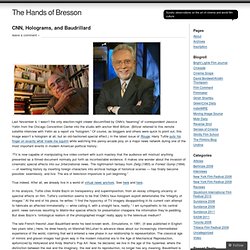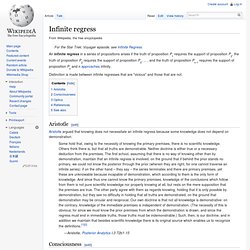

The Net: The Unabomber, LSD and the Internet (1/12) CNN, Holograms, and Baudrillard « The Hands of Bresson. Last November 4, I wasn’t the only election-night viewer discomfited by CNN’s “beaming” of correspondent Jessica Yellin from the Chicago Convention Center into the studio with anchor Wolf Blitzer.

(Blitzer referred to this remote satellite interview with Yellin as a report via “hologram.” Of course, as bloggers and others were quick to point out, this image wasn’t a hologram at all, but an old-fashioned special effect.) In the latest issue of Rouge, Harry Tuttle puts his finger on exactly what made me squirm while watching this penny-arcade ploy on a major news network during one of the most important events in modern American political history: “TV is now capable of manipulating live video content with such mastery that the audience will mistrust anything presented as a filmed document normally put forth as incontestable evidence.
It makes one wonder about the invasion of cinematic special effects into our (inter)national news. True indeed. Like this: Like Loading... Thelema. The word thelema is the English transliteration of the Koine Greek noun θέλημα (pronounced [θélima]) "will", from the verb θέλω "to will, wish, purpose.

" As Crowley developed the religion, he wrote widely on the topic, producing what are collectively termed the Holy Books of Thelema. He also included ideas from occultism, Yoga and both Eastern and Western mysticism, especially the Qabalah.[8] Historical precedents[edit] The word θέλημα (thelema) is rare in classical Greek, where it "signifies the appetitive will: desire, sometimes even sexual",[9] but it is frequent in the Septuagint.[9] Early Christian writings occasionally use the word to refer to the human will,[10] and even the will of God's opponent, the Devil,[11] but it usually refers to the will of God.[12] One well-known example is in the "Lord's Prayer" (Matthew 6:10), “Your kingdom come.
Mimesis. In ancient Greece, mimesis was an idea that governed the creation of works of art, in particular, with correspondence to the physical world understood as a model for beauty, truth, and the good.

Plato contrasted mimesis, or imitation, with diegesis, or narrative. After Plato, the meaning of mimesis eventually shifted toward a specifically literary function in ancient Greek society, and its use has changed and been reinterpreted many times since then. The Frankfurt school critical theorist T. W. Adorno made use of mimesis as a central philosophical term, interpreting it as a way in which works of art embodied a form of reason that was non-repressive and non-violent.[2] Classical definitions[edit] Plato[edit] Infinitism. Infinitism is the view that knowledge may be justified by an infinite chain of reasons.

It belongs to epistemology, the branch of philosophy that considers the possibility, nature, and means of knowledge. Epistemological infinitism[edit] Since Gettier, 'knowledge' is no longer widely accepted as meaning 'justified true belief'. However, many epistemologists still consider knowledge to have a justification condition. Traditional theories of justification (foundationalism and coherentism) and indeed many philosophers consider an infinite regress not to be a valid justification. Beginnings of Mysticism - Chapter 3 - The Equinox of the Gods. The Birth of FRATER OU MH. 7○=4□ Oscar Eckenstein, on his arrival in Mexico, where he was to climb mountains with the subject of our essay, found him in a rather despondent mood.

He had attained the most satisfactory results. He was able to communicate with the divine forces, and operations such as those of invisibility and evocation had been mastered. Yet with all this there was a certain dissatisfaction. Success had not given him all that he had hoped for. Intentionalitet. Intentionalitet är en filosofisk fackterm för fenomenet att medvetandetillstånd "handlar om" eller "är riktade mot" någonting.

Mentala tillstånd som uppvisar intentionalitet kallas "intentionala tillstånd". Det som det intentionala tillståndet är riktat mot kallas det ”intentionala objektet" för tillståndet i fråga. Exempel på intentionala tillstånd och intentionala objekt[redigera | redigera wikitext] Grader av intentionalitet[redigera | redigera wikitext] Det finns olika grader av intentionalitet. Första graden innebär bara att man är medveten om något hos sig själv eller i sin omvärld. Andra graden betyder att någon har en föreställning av intentionaliteten hos någon annan. Sally och Ann-testet kan användas för att undersöka om en person klarar andra gradens intentionalitet. Münchhausen Trilemma. Baron Münchhausen pulls himself out of a mire by his own hair (illustration by Oskar Herrfurth) The Münchhausen trilemma (after Baron Münchhausen, who allegedly pulled himself and the horse on which he was sitting out of a swamp by his own hair), also called Agrippa's trilemma (after Agrippa the Skeptic), is a philosophical term coined to stress the purported impossibility to prove any truth even in the fields of logic and mathematics.

It is the name of an argument in the theory of knowledge going back to the German philosopher Hans Albert, and more traditionally, in the name of Agrippa. [citation needed] Trilemma[edit] If we ask of any knowledge: "How do I know that it's true? " Fallibilism. Fallibilism (from medieval Latin fallibilis, "liable to err") is the philosophical principle that human beings could be wrong about their beliefs, expectations, or their understanding of the world, and yet still be justified in holding their incorrect beliefs.

In the most commonly used sense of the term, this consists in being open to new evidence that would disprove some previously held position or belief, and in the recognition that "any claim justified today may need to be revised or withdrawn in light of new evidence, new arguments, and new experiences. "[1] This position is taken for granted in the natural sciences.[2] Infinite regress. Distinction is made between infinite regresses that are "vicious" and those that are not.

Aristotle[edit] Aristotle argued that knowing does not necessitate an infinite regress because some knowledge does not depend on demonstration: Some hold that, owing to the necessity of knowing the primary premises, there is no scientific knowledge. Others think there is, but that all truths are demonstrable. Neither doctrine is either true or a necessary deduction from the premises. Consciousness[edit] Thomas Hobbes. Thomas Hobbes (1588-1679) Thomas Hobbes, född 5 april 1588 i Westport (idag en del av Malmesbury), Wiltshire, död 4 december 1679 på Hardwick Hall i Derbyshire, [1] var en engelsk filosof och politisk teoretiker.

JIM GOAD. Jean Baudrillard. Jean Baudrillard, 2004. Jean Baudrillard, född 27 juli 1929 i Reims, död 6 mars 2007 i Paris, var en fransk sociolog och filosof. Hans verk blir ofta knutna till postmodernismen samt poststrukturalismen.